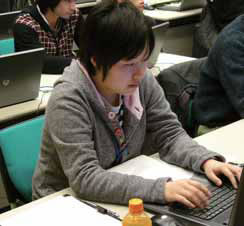CMD®18 Workshop : A First-Hand Report
Hiromi Shima
Department of Physics, Graduate School of Science,
Tokyo University of Science (at the time)
The 18th Computational Materials Design (CMD®) Workshop supported by CMSI was held March 8-12 at the International Institute for Advanced Studies. More than 700 persons from universities and companies have participated in a series of workshops, which center on the design of materials using an actual supercomputer. Hiromi Shima reports on her experiences when she attended the most recent workshop.

I'm engaged in materials research into ferroelectric thin films and piezoelectric substances. So I'm what is commonly referred to as an experimenter. My reason for participating in the most recent workshop was that I wanted to get a foot in the door to begin to learn how to perform simulations. It often happens in the search for materials that we need to combine two or more types of materials to achieve the
physical properties we're looking for. Recently it occurred to me that my research would go much more efficiently if I could predict to a certain degree through simulations what combinations would be best. I realized that I needed to study to learn how to do this, and I sat at my desk any number of times trying to study, but for some reason I was unable to maintain the effort.
Although I had applied to attend the workshop, I'm such a beginner that I was afraid the lectures and hands-on training would be over my head. It was even my first time to use the UNIX system in the hands-on training, so the only thing I could do was to type at the keyboard furiously as instructed. But in the course of finishing the series of calculations for each of the codes, I gradually came to understand what I was doing. I think this was due to the training style, in which lecturers explained everything clearly, starting with the basics, and then tutors followed up on what the
lecturers had told us. We learned three computation codes in the five-day workshop. Thinking back on it now that I've completed the workshop, I realize that the order in which they were covered was extremely well thought-out.
I couldn't say that I now have a thorough understanding of the CMD® method or I'm at the level where I could actually perform simulations for my own material systems. But with regard to calculation I think I've progressed from being a complete lay person to the beginner level. The most important result of this experience, and the one that will have an impact on the future as well, is that I got a definite response from being interested in something and working hard at it.
Photo : Masaaki Geshi (Osaka University)
Tutorial Courses
Attendees can select the course
they want to attend.
Computational Nanomaterials Design
Beginner's Course
・Lectures on the latest CMD® case
studies and special lectures
・Lectures on fundamentals of ab-initio
calculations
・Introductory hands-on training in
ab-initio calculations
(covering 3 simulation codes)
Computational Nanomaterials Design
Advanced Course
・Lectures on the latest CMD® case
studies and special lectures
・CMD® Intensive hands-on training
(concentrating on 2 simulation codes
chosen by the participant from
among the 5 codes offered)
Computational Nanomaterials Design
Expert Course
・Lectures on the latest CMD® case
studies and special lectures
・CMD® practicum
Computational Nanomaterials Design
Supercomputer Course
・Lectures on the latest CMD® case
studies and special lectures
・CMD® practicum (RSPACE)
Capacity: 25 trainees
Participation fee for trainees: No charge
(but trainees are responsible for their
own travel costs and meals)



